After a long night of negotiations
The UNFCCC delegates and a few of observers have had a long night. The closing plenaries of the two subsidiary bodies for the implementation (SBI) and for the scientific and technical advice (SBSTA) started late in the afternoon and finished early in the morning. Especially SBI, where three major issues had to be discussed: civil society participation, loss and damage and the budget of the UNFCCC (for 2012 and 2013). After a long session that started at 17:30 to finish at 2 in the morning, only two of these main points were discussed: the civil society participation and loss and damage.
The resolved two topics have been intensively discussed by the parties and especially the item concerning loss and damage. Loss and damage is a kind of insurance system against/for? climate related natural disasters occurring in the developing countries. For example, in the case of the last floods in Pakistan, this system could have been activated to meet the urgent needs of the populations displaced or affected. Saudi Arabia wanted to include a reference to response
measure (a system to allocate money to the oil countries for the loss of revenues due to the decrease in fossil fuels consumption). All the countries, except Qatar (who hopes to host the next COP in 2012) refused on the grounds that response measures is related to mitigation and not adaptation. After a TINY modification of the text at 2am this morning, the chair, Robert Owen-Jones adjourned the meeting.
The other issue discussed was the enhancement of the civil society participation in the negotiations. As usual, Saudi Arabia, and more exceptionally Antigua and Barbuda tried to undermine the participation capacity of the civil society whereas all the other groups and countries wanted to make the UN process more transparent and open. The
draft decision was amended and our ability to participate reduced, we will see next year how this new decision plays in the negotiations. As of Friday morning, the discussion on budget for the UNFCCC still remained.
At 12:30am, the chair is going to resume the SBI session and the delegates are now going to discuss the budget of the UNFCCC. Through the Cancun agreements, the parties gave more work to the Secretariat for the organisation of the workshop, the redaction of the technical papers… In consequence, the UNFCCC had to increase its budget by 15%
to meet all its objectives, money that most of the developed countries are not really keen to provide.
The process may block again. Money, commitment, mitigation, some countries always have a good reasons to stop the process from moving forward!




About the author
Florent Baarsch
Writing on adaptation to climate change. Sometimes blogger @lemondefr following #UNFCCC #climate negotiations.

